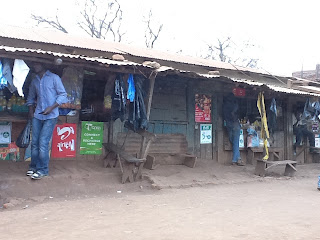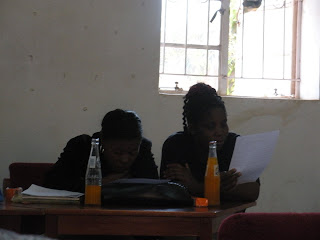I am not in love with Malawi yet. No, it's not the accommodation. I can't say I've been enjoying the luxury afforded to me at Sunbird Capital hotel since my first evening in the city, but I am living quite comfortably by anyone's standards! And no, it's not the air pollution or the red dirt-cladden feet that result from my leisurely strolls. Cleaning, roaming the town, dancing around an empty apartment, and a defunct laptop have colored my time here thus far. My welcome to the "warm heart of Africa" proved to be lukewarm, as constant technology failures only magnified the loneliness and isolation I felt on Day 3 of time here in Malawi. But perhaps I'm getting a bit ahead of myself...
I went into work at 9:30 am Thursday (decided that "jet lag" was my excuse for avoiding the 7:30 am start) and enjoyed the first two presentations of my month+ orientation. I was so impressed that Ellen, the country manager for my organization, had our orientation mapped out for us, and even more impressed to hear the progress that Malawi has made in regards to HIV responses since my thesis research (which I completed just two months ago, mind you). Ellen shared with me and my fellowship partner (and flat mate) Arthur about Malawi's approach to prevention of mother to child HIV transmission (pmtct), as well as more about the organization that we are now working for. In response to a question I posed about other actors in the realm of pmtct, I was saddened - though not entirely surprised - that the others involved in this include: Baylor School of Medicine (focused on pediatric treatment), Johns Hopkins (focused on early infant diagnosis), and Elizabeth Glaser Foundation (which trains ministry of health workers and works through UNiversity if North Carolina). Notice any commonalities?
As Arthur headed to the field to assist a consultant with an evaluation, I remained in the office, finishing my first serving of nsima (solid maize porridge or a corn-made fufu, for my Naija people) and beef stew. It is quite astonishing how much people are expected to eat in one sitting...and in the middle of the day! (Good thing that Friday's are half days). My failed attempts to connect with current fellows for the weekend contributed to a rather uneventful weekend, but I tried to make the most of it and get some much needed rest.
 |
| Nsima, beef stew, and greens - to go! |
While a normal person would have slept, I (with my jet lag and determination) spent the evening scrubbing my room and bathroom, emptying my suitcases, and making my brand new bed. My repose was unfortunately brief, so I started Saturday morning right where I left off, sweeping, mopping, organizing my room, and rearranging our cushion-less furniture. My entertainment plan had a hiccup when my computer stopped working, and so after some encouragement from my parents, I attempted to walk around the "town" a bit and grab a beer.
 |
| Kitchen...in progress. |
 |
| Bedroom. |
 |
| Eating pizza in the living room (cushions haven't arrived for the furniture yet). |
 |
| My bathroom. |
Lilongwe is Malawi's most populous city, but it seems that it's development surpassed it's planning. I walked for a few hours around different neighborhoods of this spread out city (task 1: accomplished) and while I found several grocery stores, I didn't find one bar (task 2:epic fail)! I did, however, stumble upon the end of a Christian hip hop album launch, and although I made a few friends, I think that the word "statutory" would apply, should I decide to actually keep in touch with my first Malawian non-work contacts. I ate the only food I had - some leftover nsima and a unique take on the typical Nigerian stew that I prepared earlier today after knifing open a can of tomatoes -and read through half of one of two hardcopy books I brought. Feeling inspired by the "rager" across the hall (which I was not invited to, nor did I seem welcome when I tried to find a "discrete" way to get invited), and still with no luck in finding a new buddy in Malawi, I decided to check out a local bar near my place. It seemed just a 2 min walk on my taxi ride earlier today, but as I discovered when accompanied by "Sandrassa," my non-English speaking gate security, it's nearly a 10 min walk along a very dark path (and, of course, it was not open). To make matters worse, while I desperately hoped someone- a Malawi based fellow who had my number from a mass email I sent out, or my parents, or anyone - would call, the only communication that kept coming through were the 200 text messages (no exaggeration!) that "Airtel Malawi" kindly kept sending...So yes, pathetic as it sounds, the night ended for me after midnight when the neighbor's rager died down and with an undesirable little critter scurrying across my room ...
 |
| Malawi sparks creativity in me... |
The weekend did get better, as Sunday involved interacting with people my age! There was an informal breakfast with outgoing fellows on their way to Uganda, and I met a few of Arthur's close friends, one of whom took us to a few local clubs to watch the finale of "Big Brother Africa" (and to try "kuche kuche," my first Malawian beer)! I miss my family, friends, other fellows, and little bits and pieces of the conveniences of American life (particularly, overcoming boredom and not being confined to the middle of nowhere with no phone credit, transportation, or Chichewa skills), but I'm trying really hard to maintain a positive attitude because it will get better. In addition to meeting the other fellows, I think the highlight of my weekend was finding my approximate location on the Bradt Malawi travel guide map!
 |
| Malawian beer. Now I'm happy. |
Lessons learned: 1) dress older so I attract people of legal age. 2) Figure out how to describe where I live so that when the one taxi driver I know isn't working, I'm not stranded. 3) call Airtel and beg friends to text; I only want 200 texts if they come from friends or secret lovers (just kidding about the latter!) 4) regain a sense of independence!



































